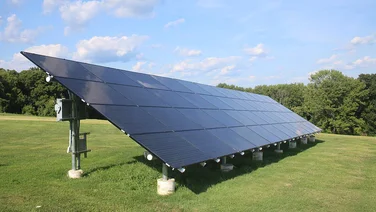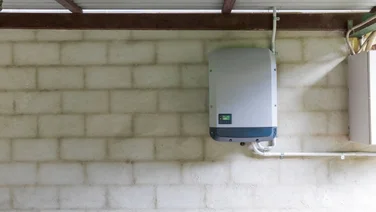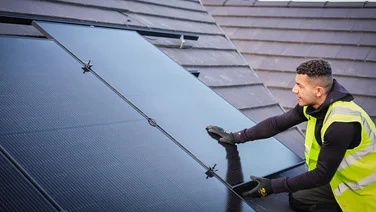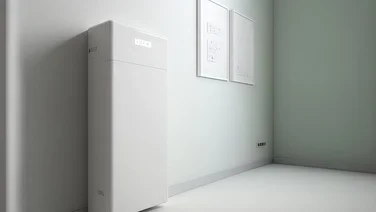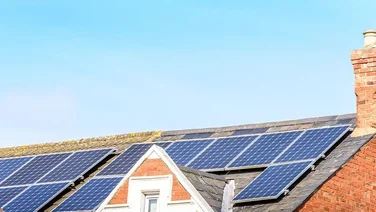We receive a small fee from trusted installers when you request a quote through our site. This helps us keep our content independent, well-researched and up to date – Learn more
- What are the benefits of solar panels?
- How much do solar panels cost?
- How do I know if it's worth getting solar panels where I live?
- How do I choose the right size solar panel system for my home?
- Is my roof suitable for solar panels?
- How many solar panels does my home need?
- What makes up the cost of solar panel installation?
- Do I need planning permission for solar panels?
- Do I need permission to connect my solar panels to the grid?
- Best solar panel installers in the UK
- How can I reduce solar panel costs?
- How long do solar panels last?
- How much does solar panels cost to maintain?
- How much do solar batteries cost?
- What do I need to consider before I buy solar panels?
- What is the Smart Export Guarantee?
- Summary
- Solar panel costs in the UK typically range from £4,000 to £10,000, depending on your property size, energy usage, and system specifications.
- Long-term savings and government incentives can help offset upfront costs, with most homeowners breaking even in just over 15 years.
- This guide includes everything you need to know about installation pricing, financing options, maintenance, and choosing the right installer.

Prices vary for a typical solar panel installation in the UK. Still, they typically range from around £4,000 for a small 2.1 kilowatt-per-hour system for a 1-2 bedroom property to many thousands for larger systems.
Solar panels reduce electricity bills by up to 70% and generate additional revenue through the Smart Export Guarantee (SEG). And they’ll still generate electricity on gloomy days, which the UK experiences a lot of.
There are government grants for solar panels, and other financing options can help massively with the upfront cost, making installation more accessible than ever.
If you know about solar panel costs and are ready to install, fill out our form, and our trusted installers will contact you.
What are the benefits of solar panels?
Solar panels offer many benefits, such as significantly cutting your electricity bills by generating your own clean power, and you can earn extra by selling surplus energy back to the grid through the Smart Export Guarantee.
But there are more besides that. As Simon Peat, CEO of Project Solar UK, explained to us in episode 9 of our popular Positive Energy podcast series, solar panels are “better for the environment because you’re generating power, better for your home because you’re creating a more efficient home.”
He also pointed out that in this sense, they are “lowering [your] bills and creating [much needed] energy security” for people.
“And of course, let’s not forget,” Peat added, “we are creating a world around electrification from a mobility perspective and from a heat perspective… All of that is complemented by solar.”
How much do solar panels cost?
According to industry averages, solar panels for the average three-bedroom house will cost £6,000. This is the average price of a 3.5 kilowatt-peak (kWp) system, which is typically the right fit for a standard three-bedroom house.
A household with one or two bedrooms generally needs a 2.1kWp system, which costs around £4,000 for six panels. The cost of solar panels depends on numerous factors, including the size of your roof, your electricity usage, whether you want to include the price of a solar battery, and the number of solar panels you need. Even the type of roofing, the height of your home, and where your electric cables are will affect the cost.
To find out how much installing solar panels could cost, fill in this quick, easy tool.
How do I know if it’s worth getting solar panels where I live?
Whether solar panels make sense for you depends on three main things:
- Your energy use – The more electricity you use during the day, the more you can directly benefit from what your panels generate.
- Your property’s suitability – Factors like roof direction, angle, shading, and condition will affect how much electricity you can produce. We’ll go into more detail on this later in the article.
- Local economics – UK households can benefit from the Smart Export Guarantee (SEG), zero-rate VAT on installations, and in some areas, regional grants or loans. Again, we’ll dive into this in more detail later.
If your home gets good sunlight, you use a fair share of power during daylight hours, and you plan to stay put for several years, solar panels are often a solid long-term investment.
They also come with the added benefit of reducing your carbon footprint. A win-win in our book.
How do I choose the right size solar panel system for my home?
The right system size depends primarily on your annual electricity usage and roof space, with a typical person requiring approximately 1-2 panels (350-400W each).
Is my roof suitable for solar panels?
South-facing roofs with a pitch between 30 and 40 degrees offer optimal suitability for solar panels in the UK. Here’s a breakdown of what to consider when assessing your roof:
- Sunlight and orientation
- South-facing roofs are best, as they provide the most consistent sunlight throughout the day.
- East and west-facing roofs also work well, though slightly less efficiently.
- North-facing roofs receive minimal sun and are often unsuitable without alternative solutions.
- Roof pitch
- Optimal pitch: 30–40 degrees for maximum sun exposure in the UK.
- Most UK roofs fall between 30–50 degrees, which is ideal for optimal drainage.
- Flat roofs can still be used, but may need angled mounting systems.
- Roof size and layout
- You will need space for at least 10 solar panels (~4 kW system).
- Larger systems may be needed for EV charging, electric heating, or full grid independence.
- Obstacles like chimneys, vents, or skylights reduce usable space.
- More complex roofs (e.g., varying pitches, cross-gables, etc.) can limit the size of some solar installations.
- Roof condition
- Your roof must be structurally sound to support panels.
- Look for damage like missing tiles, water leaks, moss, or rotting structures; these will need repairs before installation.
- New roofs may have warranty limitations, so check with your contractor.
- Roof type
- Most materials (e.g., tile, concrete) are fine.
- Slate roofs are more challenging and more expensive to install.
- Unsuitable roofs: thatch (fire risk), asbestos (health risk), and glass (not structurally sound).
- Ground-mounted systems are a viable option if your roof isn’t suitable.
- Shading
- Trees, buildings, chimneys, and even satellite dishes can reduce system efficiency.
- Even partial shading affects all panels unless optimisers like SolarEdge or Tigo are used (at extra cost).
- Installers must avoid systems with 30% or more shading, as per the Energy Performance Validation Scheme (EPVS) rules.
Note that even if your roof isn’t ideal, professional installers can often tailor solutions using optimisers, creative layouts, or ground-mounted panels. A free remote survey is usually available to help assess your roof’s potential.
How many solar panels does my home need?
|
Property size
|
Annual electricity usage
|
Number of solar panels
|
Average installation cost*
|
Annual electricity bill savings**
|
Time it takes to break even
|
Solar panel profit after 25 years
|
|---|---|---|---|---|---|---|
|
1-2 bedroom house |
3 bedroom house |
4 bedroom house |
||||
|
1,800 kWh |
2,700 kWh |
4,100 kWh |
||||
|
6 |
10 |
14 |
||||
|
£4,216 |
£7,026 |
£9,837 |
||||
|
£272.67 |
£454.45 |
£636.23 |
||||
|
15.46 years |
15.46 years |
15.46 years |
||||
|
£3,026 |
£4,335.11 |
£6,069.16 |
* Please note: These prices are based on Microgeneration Certification Scheme (MCS) cost data (March 2024), the average price of electricity (April-June 2024), and Ofgem’s latest typical domestic consumption values (2024). Total costs may increase with more complex installations. The above estimates do not include the cost of a solar battery.
** Includes estimated Smart Export Guarantee payments
What affects the cost of solar panels?
Three key factors affect the price of solar panels:
- Panel type: Some solar panel types, such as monocrystalline solar panels, cost more than others. This is because they use the latest technology and are highly efficient.
- Panel efficiency: The more sunlight a solar panel can convert into electricity per square metre, the more expensive it will be.
- Panel number: More solar panels mean more materials, which means a higher cost. You can limit the number of panels you need by choosing highly efficient ones (although they may cost more).
If you want to know more about solar panel efficiency or find out how many solar panels you need, visit our guides.
| Technology | Upfront costs | Long-term costs and maintenance | Energy savings and return on investment |
|---|---|---|---|
| Solar Panels | £4,000-£10,000 (potentially £0 if you are eligible for ECO4) | Low maintenance; long lifespan (25–30 years) | High savings on electricity bills – 70%; possible earnings via export (SEG); ROI in 7–15 years |
| Heat Pumps | £8,000-£15,000 (£1,000-£8,000 with Boiler Upgrade Scheme | Moderate maintenance; higher for ground systems | Efficient heating and hot water, strong long-term savings, and a variable payback period |
| Other Renewables (e.g., biomass, wind) | Highly variable – depends on system type and scale | Maintenance and costs vary; some systems can be complex to manage | Energy savings vary widely; ROI depends on usage patterns and local conditions |
Notes:
- Government incentives (e.g, ECO4, Boiler Upgrade Scheme) are available across all technologies and can significantly reduce upfront costs.
- Export potential (SEG payments) generally applies only to electricity-generating systems, such as solar panels or wind turbines.
- System suitability and site-specific factors (space, climate, demand) often determine which technology is best for a household or business.
What makes up the cost of solar panel installation?
The total cost of installing solar panels varies between suppliers, but generally breaks down into three main categories: materials, business overheads, and labour. Understanding these can help you spot fair quotes—and avoid inflated ones.
1. Materials (40–50%)
This includes the panels, brackets, inverter, cables, and other necessary equipment. For an average three-bedroom home, expect materials to cost around £3,150. Installers usually apply a 30% markup on base material prices to cover profit, which is standard across the industry. When comparing quotes, don’t hesitate to ask for a breakdown of material costs.
2. Business Costs (30–40%)
These are the operational costs your installer absorbs, including:
- Planning permissions and approvals
- Scaffolding setup
- Transport, fuel, and equipment
For a typical 3.5kWp system, this category adds about £2,450 to the total bill.
3. Labour (10–30%)
This covers the physical installation, wiring, and system setup. Labour costs vary based on system size and complexity—larger systems or tricky rooftops will cost more.
Solar panel installation usually takes one to two days, but larger installations – over 14 panels – can take up to four days.
Much of this time is spent constructing the scaffolding, so don’t be concerned if it’s been a few hours and there still aren’t panels on the roof.ustomers should be aware of installers pushing limited-time offers on solar panels. Instead, you should get quotes from at least five reputable installers and check their Trustpilot reviews before signing a contract.
Do I need planning permission for solar panels?
You need planning permission to install solar panels if you live in a listed building or conservation area. You will also need planning permission if your solar panel sticks out more than 20cm from your roof or if you are installing ground-mounted solar panels. You will also need planning permission if you are installing solar panels for commercial use.
However, solar panels are considered a ‘permitted development’ which means for most people you don’t need planning permission, as long as none of the above applies.
To check if you need planning permission, find out if your home is a listed building or use the national Planning Portal for guidance. A Lawful Development Certificate will tell you if you need planning permission.
Do I need permission to connect my solar panels to the grid?
You need permission from your local Distributor Network Operator (DNO) before installation if your solar panel system are over 3.68kWp on a single-phase supply, or an 11kWp on a three-phase supply.
A single-phase supply is considered the standard for most solar panel systems because most houses use one for everyday appliances. A three-phase supply is usually for much larger systems, such as you might find on an industrial site.
If your home has more than four bedrooms it will need a solar system larger than 3.68 kW. A four-bedroom house requires a 4.5 kW to 5.2 kW solar system. If you need a solar system bigger than 3.68 kW, you will need to submit a G99 application to your local DNO for approval before installation.
How do I apply for a G99 application?
The first thing to do is chose an installer from the MCS. Your installer will assess your site and the exact system size you need. The next thing is documentation, which your installer will organise. They will need system layout and single-line electrical diagrams.
Other documentation your installer will need are your property address, your Meter Point Administration Number (MPAN) and a letter of authority from the homeowner or landlord.
Once the applications is submitted to your DNO, the DNO will assess the potential impact of your system on the local grid. This process will take between four to eight weeks. You might have to pay for any potential costs to upgrade the local network. Once you have done so, your system must undergo specific commissioning tests to prove compliance with G99 standards.
After this, your installer sends a report to the DNO, who will then give you an export MPAN, which lets you sign up for the Smart Export Guarantee.
Best solar panel installers in the UK
Our team analysed 643 of the UK’s 4,000+ MCS-certified solar panel installers. Below, we’ve ranked the top 15 based on customer service, warranties, accreditations, affordability, and experience.
- Project Solar UK – Lifetime product warranty, 10-year labour warranty.
- Solar Fast – Panels covered for 25 years, performance for 30 years, inverters 10–12 years. Labour warranty: 2 years.
- Octopus Energy – 25-year product warranty, 5-year labour warranty.
- Solar4Good – 25-year panel warranty, 30-year performance warranty, 10-year labour warranty.
- Geo Green Power – Similar to Solar4Good. 2-year labour warranty. Est. 2010.
- Heatable- 25-year panel warranty, 2-year labour warranty.
- Soly – Dutch company with UK launch in 2023. Up to 12-year labour warranty, 25-year panel warranty.
- Egg – 25-year product warranty. Labour warranty is not specified.
- Glow Green – Up to 30-year product warranty, 5-year labour (20 years under subscription).
- Everyone’s Energy UK – 25-year product, 2-year labour warranty.
- Effective Home – 25-year panel warranty, 2-year labour warranty.
- 0800 Repair – Labour warranty 1 year. Product warranty not disclosed.
- Clever Energy Boilers 0 Up to 30-year panel warranty, 10–12-year inverter warranty, 2–5-year labour.
- Warma UK – 25-year panel warranty, 2-year labour warranty.
- Greener Energy Group – 25-year product warranty. Labour warranty not disclosed.
How can I reduce solar panel costs?
The best way to reduce the cost is take advantage of government solar panel grants. Here are the main ones:
- ECO4 scheme: Funding for solar panels for energy-poor households on certain benefits
- Solar Together: A group-buying scheme that can save you 30-50% on the cost of solar panels
- The Home Energy Scotland Loan: An interest-free loan for solar panels available for most Scottish residents
- Warm Homes Local Grant: This grant provides funding for low-income households with EPC ratings between a G and D. It covers various energy efficiency measures, including solar water heaters, particularly for homes off the gas grid.
For more information on eligibility requirements and how to apply for these schemes, check out our guide to solar panel grants. You can get solar panels on finance from a variety of established companies, including:
- E.ON
- Scottish Power
- SolarStyle
- Sunsave
For E.ON solar panels, for example, prices for a typical six-panel (2.61kWp) solar system start at £5,785 and can be bought on finance.
Its interest-free option enables you to install this for £241.04 per month over 24 months.
Can I get solar panels on finance?
Installing solar panels in the UK is more affordable thanks to a range of government-backed incentives, tax relief, and financing schemes. Here’s a quick overview of what’s available to homeowners and businesses:
- Tax Benefits
- 0% VAT on Solar Panel Installations – Residential installations now benefit from zero-rated VAT, resulting in a 20% reduction in upfront costs.
- Capital Allowances for Businesses – Companies investing in solar panels can deduct some or all of the cost from their taxable profits using First-Year Allowances or Writing-Down Allowances.
- Smart Export Guarantee (SEG)
- Earn money for the surplus electricity you generate and export to the grid. All large energy suppliers are required to offer SEG tariffs.
- Financing Options
- Green Deal Loans – Government-supported loans repaid through energy bill savings. Available for solar panels and other energy efficiency upgrades.
- Power Purchase Agreements (PPAs) – Ideal for businesses, installers retain ownership and maintenance, and the business pays only for the energy used at a fixed rate.
- Local Grants & Council Rebates – Some councils offer financial support for renewable energy installations. Check your local authority’s website for current opportunities.
- Green Loans – Offered by banks and credit providers for renewable energy systems. These can spread installation costs with manageable repayments.
When will I break even on solar panels?
Average UK households break even on solar installations in 15.66 years based on 2024 MCS cost data and typical energy usage.
Solar panels typically last at least another 10 years after this point. On average, a three-bedroom household will profit from energy bill savings and SEG revenues of £4,335.11. A one-to-two-bedroom home will benefit from £2,601.07, while a four-bedroom home will generate £6,069.16.
We base our calculations on the latest MCS data on solar panel costs and the yearly daylight hours in the UK. For all the nuts and bolts, please check out our full page, “Are solar panels worth it?“
In the meantime, use this table to determine the break-even point and savings you can make for each different panel system:
| System size | System cost | Annual savings | Break even point |
|---|---|---|---|
| 2.1 kWp | £4,216 | £272.67 | 15.46 years |
| 3.5 kWp | £7,026 | £454.45 | 15.46 years |
| 4.9 kWp | £9,837 | £636.23 | 15.46 years |
*Note that the figures above are illustrative only.
How long do solar panels last?
Solar panels last between 25-30 years. Modern solar panels have a degradation rate of around 0.5% a year, which means after 25 years they could retain 80-90% of their original capacity.
If you want your solar panels last longer make sure you avoid physical damage to the glass, as scratches can make them degrade faster. Make sure you maintain your solar panels regularly and clean them, especially after snow or bad weather.
Perhaps the most important thing to do is to make sure your solar panels are installed properly, which you can do by check that your installer has MCS qualifications.
How much does solar panels cost to maintain?
Solar panels require minimal upkeep, but you should budget for three key maintenance costs over time. First, the inverter, which converts solar energy into usable power, costs £500 to £1,000 and typically needs replacing every 10 years.
Second, while panels are durable, repairs may be needed due to damage from weather or wildlife, with costs ranging from £80 for minor fixes to £1,500 for major ones; preventative steps like bird-proofing can help.
Lastly, while UK rain helps keep panels clean, professional cleaning is recommended twice a year at around £100 per visit, especially after dry spells or heavy bird activity.
How much do solar batteries cost?
A solar battery stores excess electricity generated by your solar panels during the day for use at night, allowing you to utilize about 30% more of your solar energy. However, because batteries typically last around 12 years, you may need to purchase two or even three over the lifetime of your solar panels, significantly increasing costs.
Higher-capacity batteries store more energy but are more expensive. For more details, including grant availability and comparisons, see our complete guide to solar batteries.
What do I need to consider before I buy solar panels?
Before investing in solar panels, ask yourself these key questions to make sure you’re making the right choice for your home and budget:
- Is your roof suitable? Ideally, it should be south-facing (though east or west is acceptable) and angled between 10 and 60 degrees for maximum efficiency.
- Can your roof support the weight? A standard 10-panel system weighs around 441 pounds (200 kg), so a structural inspection is often a wise step.
- What size system do you need? Your household’s electricity usage will determine the number of panels and overall system size required.
- Should you include a solar battery? Batteries let you store unused power and reduce reliance on the grid, but can add £2,500–£8,000 to your total cost.
- Would selling energy via the SEG be better? If you skip the battery, the Smart Export Guarantee (SEG) lets you sell excess electricity back to the grid—just ensure you have a compatible smart meter installed.
- Have you compared quotes? Get prices from at least five MCS-certified installers and check customer reviews to ensure you choose a trustworthy provider.
When selecting an installer, don’t just compare costs. Look at the type of solar panels they use, warranty terms (ideally 20–30 years for products and at least 10 years for workmanship), and whether they help you access grants or financing schemes.

What is the Smart Export Guarantee?
The Smart Export Guarantee is a UK government-backed scheme that requires large energy suppliers to pay homeowners for the excess renewable electricity they export to the National Grid.
Eligible technologies include solar panels, small wind turbines, micro combined heat and power (micro-CHP), hydropower, and anaerobic digestion.
How it Works
- You generate renewable electricity at home.
- Any unused power is exported to the grid.
- Your energy supplier pays you a fixed rate per kilowatt-hour (kWh) exported.
- To qualify, you must:
- Have a certified (MCS) installation
- Use an export-capable meter (usually a smart meter)
- Apply with a SEG-registered supplier
Typical SEG earnings
| System Size | Bedrooms | Panels | Annual SEG Earnings (avg) |
|---|---|---|---|
| 2.1 kWp | 1–2 beds | 6 | £95 |
| 3.5 kWp | 3 beds | 10 | £159 |
| 4.9 kWp | 4+ beds | 14 | £222 |
Note: These figures assume a 12p/kWh SEG rate (available to all via Scottish Power). Better rates are available for customers with batteries and those using certain suppliers (e.g., up to 27p/kWh with Octopus).
Typical SEG earnings by location (3.5 kWp System)
| Region | Annual SEG income | Estimated payback time |
|---|---|---|
| South Wales | £181 | 12.4 years |
| South East England | £179 | 13.0 years |
| Midlands | £156 | 14.8 years |
| North West England | £157 | 14.3 years |
| North Scotland | £133 | 17.7 years |
Note: Sunlight exposure affects SEG income, with southern regions earning more due to longer hours of sunshine.
We spoke with Ken Munro from Pen Test Partners, about the company’s experience with getting solar panels.
How much did your solar panel system cost and how long did it take to break even?
“We spent around £21,000 (ex VAT) for three 8.5 kWp arrays. The break-even is hard to calculate, as the price of electricity has been very variable over the last couple of years. We also introduced a scheme to encourage use of EVs and allow team members to charge for free at the office. This significantly increased our power consumption, though most of this was offset through PV generation.”
“The three arrays generated ~5MWh over the last 12 months. We calculated at the time of install that break-even point would take three years, though this assumed no movement in the price of electricity or increased consumption from EV charging.”
What do you spend on maintenance for your solar panels?
“Nothing!”
Did you install solar batteries and if so, what did it cost you?
“Yes, we have three 13.5 kWh batteries, one for each office unit. Each cost ~£6k. The result is that we rarely consume grid power overnight when the office is closed. During the winter we charge the batteries overnight at a cheaper rate.”
What advice would you give to other businesses on reducing the cost of solar panels and what to look out for?
“You don’t necessarily need MCS certification for the install, though may be required for certain Smart Export Guarantee tariffs. Installer margins can be high, particularly for batteries, so shop around. Maintaining MCS certification can be expensive for installers, which can add cost to your install. If you let your office premises, do speak to your landlord and consider structural load on the roof. If your lease ends or you need to move, what happens to the solar panels?
My advice would be to install the largest system you can justify. Individual panels are cheap, so the marginal cost of a larger system seems very worth it to me.
Note: These figures assume a 12p/kWh SEG rate (available to all via Scottish Power). Better rates are available for customers with batteries and those using certain suppliers (e.g., up to 27p/kWh with Octopus).
Summary
- Solar panel costs vary, but most UK households can expect to pay between £4,000 and £10,000, depending on system size and complexity.
- While the upfront cost may seem high, long-term savings on energy bills and Smart Export Guarantee earnings can make solar panels a wise investment.
- Most households break even after around 15 years, with potential profits of £2,600 to over £6,000 over a typical panel’s lifespan.
- Costs can be reduced through government grants, financing options, and schemes like Solar Together or ECO4.
- Adding a solar battery increases your self-sufficiency and reduces total system costs.
- For the most accurate pricing and savings estimates, compare quotes from multiple MCS-certified installers in your area.


